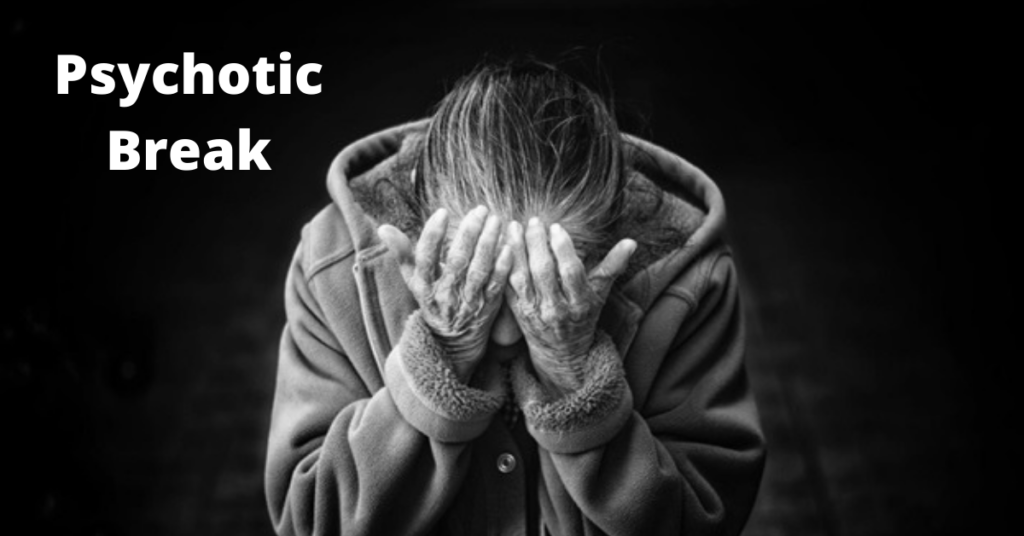What is psychosis? Psychosis is a mental disorder. Some of these are delusions, hallucinations, and disorganized speech or behavior. Psychotic disorders are either positive or negative depending on the person’s mood when they are experiencing symptoms. A psychotic break can be triggered by an underlying medical condition, drug use, stress, trauma, sleep deprivation, genetics, and more. This blog post will discuss what causes psychosis in detail so that you know how to protect yourself from these debilitating episodes!
Contents
What Is Psychotic Break?
A psychotic break is a term used when someone has an episode that makes them unable to tell what’s real. A psychotic break is often temporary. In most cases, a person will return to their normal mental state shortly after the break ends. Although sometimes people have psychotic breaks that linger and can require long-term treatment.
Psychotic Break Symptoms
There are many symptoms of a psychotic break. Some of the most common symptoms include:
- Delusions: False beliefs that are not based on reality. For example, believing that someone is out to get you or that you have superpowers
- Hallucinations: Seeing, hearing, smelling, feeling, or tasting something that is not there
- Disorganized Thinking and Speech: Racing thoughts, speaking gibberish, or saying things that don’t make sense
- Inappropriate Emotions or Behavior: Laughing at a funeral or becoming extremely agitated for no reason.
Causes of Psychotic Break
There can be many different causes of a psychotic break. Some of the most common causes include:
Psychiatric Illness
This can be a mental illness like schizophrenia, bipolar disorder, or major depression.
Drug Abuse or Withdrawal
People who are addicted to drugs or are withdrawing from drug use can sometimes experience a psychotic break.
Trauma or Stress
Severe stress or trauma, such as the death of a loved one, can trigger a psychotic break.
Brain Injury
A head injury can cause a person to have a psychotic break. This is a reason why it’s important to always wear a seatbelt when you’re in a car.
Medical Problems
Some medical conditions, like thyroid disease or brain tumors, can cause a person to have a psychotic break.
Lighting And Sound Sensitivity
People who are very sensitive to light or sound can sometimes experience a psychotic break. This is called sensory overload.
Other Medical Problems
Many different medical problems can cause someone to experience psychosis, including thyroid disease and brain tumors.
Diagnosis of Psychotic Break
There are many different ways to diagnose a psychotic break. Doctors will often want to talk with the person who is experiencing psychosis, their family or friends, and get information from medical reports if they are available.
Lab Tests
This is a way to rule out other medical causes of psychosis. These lab tests can include things like drug tests, thyroid function tests, or blood tests to find out if there are any other medical problems that may be causing the psychosis.
Brain Imaging
A brain-imaging test can help doctors rule out certain conditions that could cause psychosis. These types of images might include a CT scan or MRI. The doctor will also check for physical signs of mental illness by performing a thorough head-to-toe exam.
Behavioral Tests
This is another way to diagnose psychotic breaks and determine what type of treatment should be given after a diagnosis has been made. Brain scans combined with behavioral testing can give the most accurate results possible when it comes to diagnosing someone who has experienced a psychotic break as well as determining how best to treat them based on their condition and personal needs.
CT Scan
This is a type of scan that uses x-rays to create pictures of the brain. It can help doctors see if there is any physical damage to the brain that might be causing the psychosis.
EEG
This test records the electrical activity in the brain. It can help doctors see if there are any changes in how the brain is functioning that might be causing psychosis. This test is often used to diagnose people who have epilepsy.
Treatment of Psychotic Break
Once a person has been diagnosed with a psychotic break, they will need long-term treatment. This treatment may include medication, therapy, and lifestyle changes.
Medication
There are many different types of medications that can be prescribed for someone who has experienced a psychotic break. These medications can help reduce or control the symptoms of psychosis.
Therapy
Psychotherapy is a type of therapy that can be very helpful for people who have had a psychotic break. This therapy can help the person understand their condition and how to best deal with the symptoms.
Lifestyle Changes
There are some lifestyle changes that can be helpful for someone who is experiencing psychosis. These changes might include getting enough sleep, eating a healthy diet, and exercising regularly. Some other lifestyle changes that can be helpful include avoiding alcohol and drug use, as well as reducing stress.
Conclusion
Psychosis is a serious mental illness that can lead to psychotic breaks. It’s important for people with schizophrenia or psychosis to get treatment because untreated psychosis can result in hospitalization and homelessness. If you are experiencing hallucinations, delusions, mood swings, or other symptoms of psychosis it may be time to seek help from your doctor who will prescribe medication that could potentially save your life. Get the help you need before it’s too late.
If you are looking for affordable Online Counseling MantraCare can help: Book a trial therapy session


